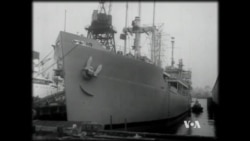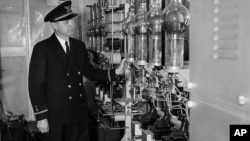In 2014, long after the end of the Cold War, the USS Courier may not be familiar to most Americans, citizens of the former Soviet Union or the Eastern bloc. But, between 1952 and 1964, this Coast Guard vessel floated off the coast of Rhodes, Greece, and beamed thousands of hours' worth of Voice of America broadcasts behind the Iron Curtain. Ever since, veterans of this unique partnership have held anniversary reunions to celebrate their mission and the friendships it fostered. This year, they gathered at the United States Coast Guard Academy in New London, Connecticut to enjoy an exhibit dedicated to the Courier.
Cold War newsreels about the Coast Guard-VOA partnership sound dated to some, but for people on both sides of the Iron Curtain separating the Soviet Union and Eastern Europe from the West, the struggle between communism and democracy was very real.
“We were real proud of our job. We got through to people who couldn’t hear the truth and we kept working to get that message across and it made us feel good to know that they got the truth from somewhere, that in their native countries was censored,” said Bob Marriott, who was part of the Courier’s original Coast Guard crew.
Along with news, listeners behind the Iron Curtain also relished VOA’s musical and cultural programming.
To relay its broadcasts, the Courier used antennas far more powerful than land-based AM stations.
Maintaining a clear signal when the Soviets tried to disrupt or “jam” VOA broadcasts was a constant challenge that Bob Marriott likened to a high stakes game of “cat and mouse.”
“We were matching our wits against the guy in Russia that was trying to jam us. And we took pride in having a couple extra frequencies available so when he lined up on our frequency, we clicked him off and got another one and kept the program going. We were the tip of the bayonet. It felt real good,” said Marriott.
Unlike most military ships, the Courier did not carry heavy armaments or weaponry, much less bayonets. It relied on Navy vessels to come to its aid if the need arose, which sometimes happened.
The Courier and VOA crews, along with their money, were a boon to Rhodes itself, which had been nearly destroyed during World War II, said Maria Lowther, a Greek who had come to the island as a refugee and later married a Coast Guardsman.
“We did not have enough money to put food on the table and all of a sudden, this ship appears,” recalled Lowther. "And the money started flowing. But above all, it was the dignity of the people that was saved. The American spirit was absolutely unbelievable.”
The families of Coast Guard and VOA personnel lived on Rhodes, where they bonded with the islanders. The visitors also feasted on the American spirit the VOA provided, especially in the form of rock and roll.
Denise Clemens was an American teenager whose father was an engineer aboard the Courier. She recalled the affections of one Greek.
“I had a boy who was crazy about me and that was because of those VOA broadcasts. He wanted a ticket to America. And he decided I was his ticket. And so every time I would walk anywhere he’d ride his bicycle around and around singing, ‘You Are My Destiny,' by Paul Anka at the top of his lungs. He might not have known any other English, but he knew those words,” said Clemens.
That boy never did win Denise’s hand.
For their part, the American Coast Guardsmen and their families consider themselves winners many times over. As one veteran officer who attended the U.S. Coast Guard Academy’s commemorative exhibit put it: “It almost makes you cry. We made lifelong friends and comrades, and we helped win the Cold War without firing a shot. Not bad. Not bad at all.”










